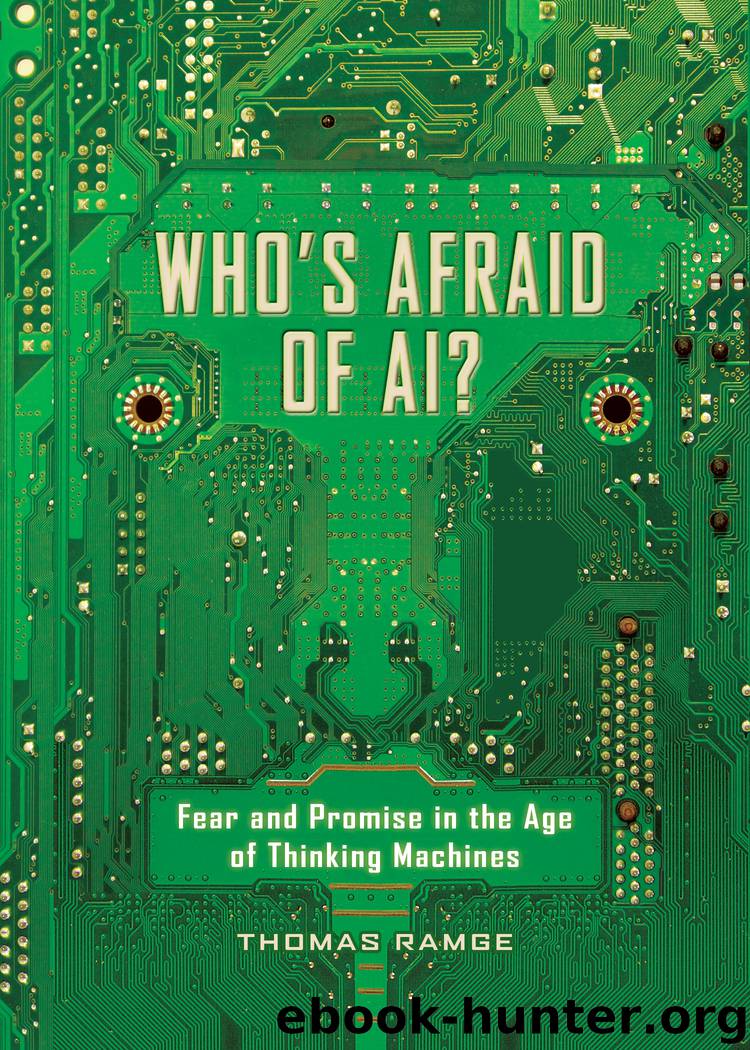Who's Afraid of AI? by Thomas Ramge

Author:Thomas Ramge
Language: eng
Format: epub
Publisher: The Experiment
Chapter 4
Human Asks, Machine Answers: AI as a Daily Assistant, Salesperson, Lawyer, and Doctor
“And how does it feel to be dead?”
—THE ELIZA CHAT PROGRAM, responding to the claim
“I am dead.”
Virtual Assistants
“Alexa, tell me a tongue twister.” Alexa doesn’t have to think long and says, “Bluebeard’s blue bluebird.” The slightly leaden woman’s voice in Amazon’s cylindrical speaker naturally doesn’t stumble over any words. Alexa—or more precisely, the data-rich system in the Amazon cloud that’s behind the Echo product family—has a large inventory of stale jokes. “How do you know if you are a pirate? You just arrrrr.” The inter-active speaker is also happy to sing Christmas carols on human command. Since the product’s introduction in 2015, Amazon Echo’s gag functions have been the subject of much laughter and much mockery, depending on one’s taste in humor. But for all the debate about the system’s playful functions, it’s often overlooked that Amazon Echo is not a toy, but rather a technological breakthrough on the path toward intelligent daily assistants.
Simply by issuing voice commands while lying on the couch, users of Amazon Echo can turn up the heat, dim the lights, and ask Alexa to find a Netflix series that’s similar to Narcos but not so brutal. As they stand in front of their closet, they can quickly ask how the weather’s going to be, and in the kitchen, up to their elbows in cake batter, they can ask for fresh eggs to be added to the shopping list. Alexa reads the news aloud or announces when their favorite team has scored a touchdown. American customers can have their bank account balances called out to them or a pizza ordered from Domino’s. Amazon’s line of products are of course available worldwide, along with its well-known recommendation routines, but it would fall short of the mark to see in Alexa nothing but a sales machine. Definitions and current facts can be retrieved through dialogue. For this the system brings together information from various online sources such as Wikipedia or news websites and tries to place it in the appropriate context.
The technical term for systems like Alexa is virtual assistant. Often, they are simply referred to as bots. For several years, the giants of digital technology in the United States and Asia have been battling for dominance in speech-controlled virtual assistants. They have assembled gigantic teams of data scientists and machine-learning experts, acquired AI startups—such as Samsung’s acquisition of the California company Viv Labs, progenitor of Viv, a rising star among virtual assistants—and formed surprising alliances, such as the one between Microsoft and Amazon, which in the future will let their digital helpers cooperate in service of the user. These companies are making this effort not out of pure love for technological progress, but rather out of fear for their commercial existence. Today it’s clear to the strategists at Apple (with Siri), Google (with Google Assistant), Microsoft (with Cortana), and Samsung (with Bixby) that in the future access to many, probably even most, digital services will take place as it does on the Starship Enterprise: A human being asks, and a machine answers.
Download
This site does not store any files on its server. We only index and link to content provided by other sites. Please contact the content providers to delete copyright contents if any and email us, we'll remove relevant links or contents immediately.
Whiskies Galore by Ian Buxton(40620)
Introduction to Aircraft Design (Cambridge Aerospace Series) by John P. Fielding(32367)
Small Unmanned Fixed-wing Aircraft Design by Andrew J. Keane Andras Sobester James P. Scanlan & András Sóbester & James P. Scanlan(32155)
Craft Beer for the Homebrewer by Michael Agnew(17472)
Turbulence by E. J. Noyes(7078)
The Complete Stick Figure Physics Tutorials by Allen Sarah(6657)
Kaplan MCAT General Chemistry Review by Kaplan(6083)
The Thirst by Nesbo Jo(5814)
Bad Blood by John Carreyrou(5798)
Learning SQL by Alan Beaulieu(5444)
Weapons of Math Destruction by Cathy O'Neil(5068)
Man-made Catastrophes and Risk Information Concealment by Dmitry Chernov & Didier Sornette(4770)
iGen by Jean M. Twenge(4713)
Digital Minimalism by Cal Newport;(4605)
Life 3.0: Being Human in the Age of Artificial Intelligence by Tegmark Max(4534)
Audition by Ryu Murakami(4122)
Electronic Devices & Circuits by Jacob Millman & Christos C. Halkias(4061)
1,001 ASVAB Practice Questions For Dummies by Powers Rod(4055)
Pale Blue Dot by Carl Sagan(4031)
